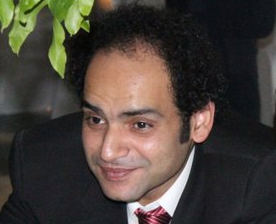
President Mohamed Morsi has been stubborn and closed-minded towards his interpretation of today’s events. Morsi and his Muslim Brotherhood clearly fell in the state’s institutional trap. Similar to Mubarak’s last 10 years in office, Morsi over this past year was constantly losing contact with the street and relying more and more on the state and its institutions as tools that are more powerful than the people. Thinking that the state is capable of controlling the people’s collective will is Morsi and the Brotherhood’s most serious mistake.
Morsi took the strangest decisions at the strangest times, as if he doesn’t even read newspapers. During the peak of the rebel campaign, and in response to fast-growing opposition and serious accusations to Morsi himself, he decided to appoint new governors from Islamist movements and parties, the least problematic of whom remains “controversial”. The change of governors at this particular time shows how Morsi is underestimating the outcome of 30 June thinking that it will pass just like any other demonstration. The new governors will then be able to give all the electoral help needed to Islamist candidates running for Parliament in their jurisdiction.
The speech Morsi delivered on Wednesday night, which was closer to “free association”, showed how much Morsi is planning to rely on the state and its different institutions. The speech was two and a half hours of desperate attempts from Morsi to prove that he is the all-knowing, all-powerful and all-capable president. How he kept repeating things like, “I am the Supreme Commander of the Armed Forces,” showing his need to win the apparent power struggle that’s starting to emerge within different state institutions. What Morsi did in 2.5 hours was not an account of his achievements over a year; it was a display of where Morsi’s power reaches. And it does not matter where Morsi thinks his power reaches; the actual weight of his power will be determined in the street over the next few days.
What Morsi does not realise is the fact that he is out of political options. The main tools in Morsi’s hands at the moment are his fellow supporters from the Brotherhood, or from any other Islamic front. These are the people who threatened to use violence in defence of Morsi’s legitimacy, and who stated that no one shall enter the palace unless it’s over their dead bodies. Those Islamic hardliners and radicals have nothing to offer but violence. They could not even convince the Salafists to join them in defence of Morsi, so their chances of mobilising more people are minimal. At this current state of polarisation, any violence will indeed be returned, which in the long run is not in the interest of the Brotherhood.
Morsi’s control over coercive institutions is still a questionable matter; his contact with non-Islamic political forces is non-existent. There is noticeable lack of communication between Morsi and the millions that Tamarod represents. All these facts put Morsi in a position where he is not capable of engaging in political negotiations.
Even if Morsi decides to give some political compromises, it will simply be the beginning of a long series of compromises, which will keep raising the ceiling until Morsi is no longer in the picture. The time to make political compromises is long gone, and Morsi wasted it relying on state institutions that he does not utterly control and on supporting demonstrations that the Brotherhood promised to stage.
Whether he admits to it or not, Morsi is out of political options. His belated response will have a price that Morsi himself will be the first to pay. When Mubarak waited 4 days to change the government, it was already too late. But the outcome of 30 June will depend on the numbers taking to the streets, joining the sit-ins and those willing to help provide for those events in the first place. The numbers will not only determine the intensity of political pressure, they will also influence the position of coercive state institutions.
In other words, the collapse of the Brotherhood regime has already begun. Even if 30 June is simply the beginning, there are enough social and political forces at the moment to continue the process. Morsi has reached the point where he either has to admit to his failures or personally deal with the consequences of denying them.



